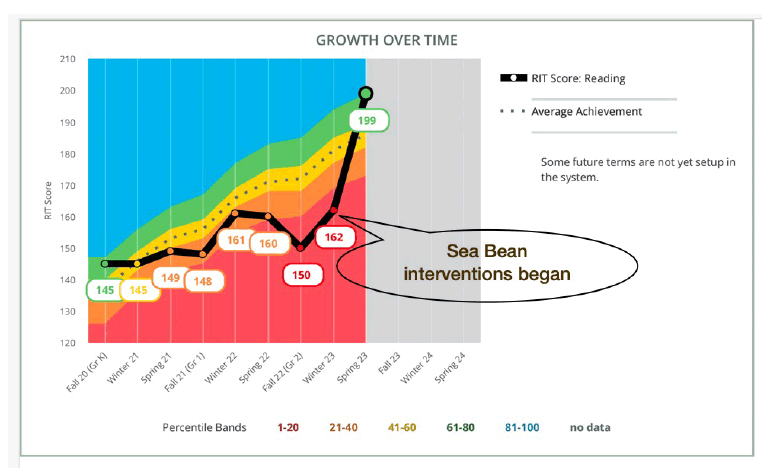Every child comes to us with a unique set of skills and experiences.
This student came to us in March of their 2nd grade school year as a reluctant reader who was multiple years behind on various reading assessments. The student has been underperforming in the area of reading since Kindergarten. Despite being given access to the general curriculum as well as additional reading interventions, the students score remained relatively unchanged.

The child had no physical disability which would impede reading such as a hearing or vision impairment and had a completely unremarkable social history. In fact, the student came from a home with two supportive professional parents and had been attending the same school for all three years.
The child was placed into additional reading intervention classes in Kindergarten and they continued until the fall of 2nd grade when the school decided to increase the frequency of intervention. After winter of 2023 testing showed only moderate progress, the family reached out to Sea Bean Consulting.
We conducted a thorough assessment of the students reading skills including, phonics, phonemic awareness, comprehension, vocabulary, and fluency abilities. After discussing options with the family, we agreed on a specific agenda and methodology to target the underlying causes of the reading dysfunction and agreed to meet 2 times per week for one hour each from March until May.
When the child retook the school’s curriculum-based measure seen below, the child grew from well below the 20th percentile to nearly the 80th percentile nationally. Meaning this student was now performing better than 80% of 2nd graders from a nationally normed sample!

A relatively flat line over time indicates a failure of the general curriculum and/or interventions to educate the student. Additionally, if there was a language based learning disability, it’s highly unlikely the data would jump 40 percentile points with just 3 months of intervention. This is not a failing of the child or family but a failure of the school curriculum and interventions. And this is not an isolated student in an isolated school.
This child was not going to ‘outgrow’ this lack of effective instruction. They were not going to magically ‘mature into a reader’ one day. And they certainly didn’t need to ‘try harder.’ More of the same ineffective instruction and intervention was clearly not the answer. Coming to us was the answer.
What this data cannot capture is the intense sadness, deep embarrassment, and total lack of confidence that this child displayed during our initial assessment. Nor do we have an effective method for capturing the child’s newly found confidence and sense of pride at being a fully functional reader who now LOVES reading and has maintained those high scores throughout 3rd grade.
